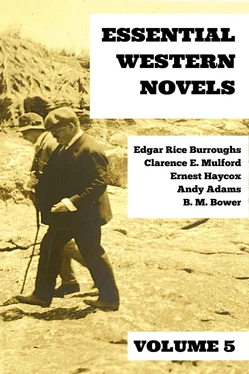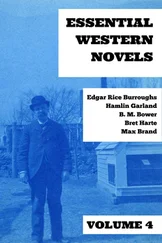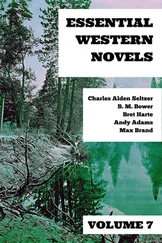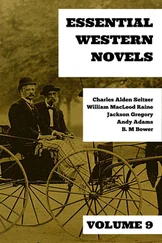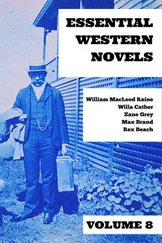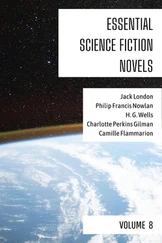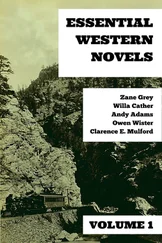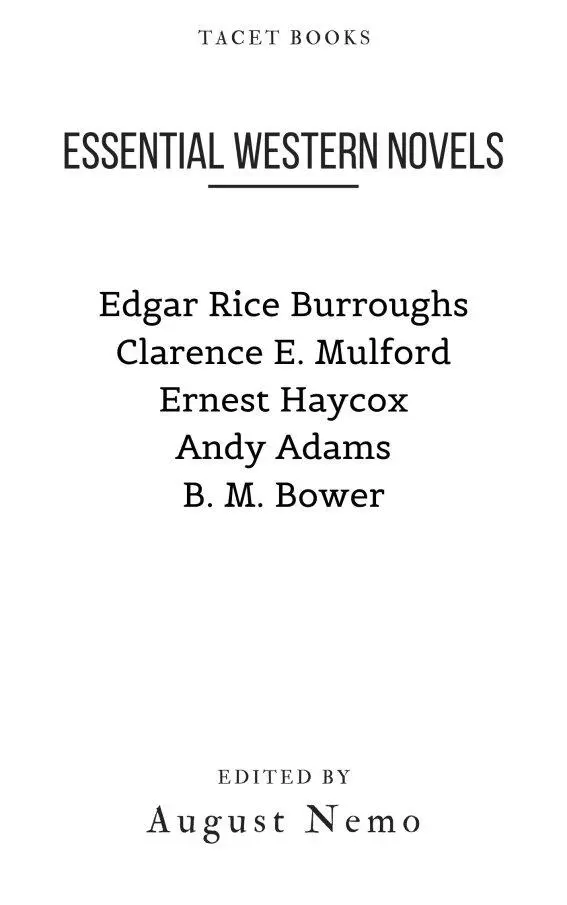
Title Page
Introduction
Son of the West
Johnny Nelson
Wells Brothers
Apache Devil
The Range Dwellers
The Authors
About the Publisher


Western is a genre of fiction set primarily in the latter half of the 19th century in the Western United States, which is styled the "Old West". Its stories commonly center on the life of a nomadic cowboy or gunfighter armed with a revolver and a rifle who rides a horse. Cowboys and gunslingers typically wear Stetson hats, neckerchief bandannas, vests, spurs, cowboy boots, and buckskins (alternatively dusters). Recurring characters include the aforementioned cowboys, Native Americans, Spaniards, Mexicans, bandits, lawmen, bounty hunters, outlaws, gamblers, soldiers (especially mounted cavalry, such as buffalo soldiers), and settlers (farmers, ranchers, and townsfolk). The ambience is usually punctuated with a Western music score, including American and Spanish/Mexican folk music such as country, Native American music, New Mexico music, and rancheras.
Westerns often stress the harshness of the wilderness and frequently set the action in an arid, desolate landscape of deserts and mountains. Often, the vast landscape plays an important role, presenting a "mythic vision of the plains and deserts of the American West." Specific settings include ranches, small frontier towns, saloons, railways, wilderness, and isolated military forts of the Wild West.
Common plots include:
• The construction of a railroad or a telegraph line on the wild frontier.
• Ranchers protecting their family ranch from rustlers or large landowners, or who build a ranch empire.
• Revenge stories, which hinge on the chase and pursuit by someone who has been wronged.
• Stories about cavalry fighting Native Americans.
• Outlaw gang plots.
• Stories about a lawman or bounty hunter tracking down his quarry.
Many Westerns use a stock plot of depicting a crime, then showing the pursuit of the wrongdoer, ending in revenge and retribution, which is often dispensed through a shootout or quick-draw duel.
The Western has been recognized as the most popular Hollywood film genre of the early 20th century through the 1960s. Western films first became well-attended in the 1930s. John Ford's landmark Western film Stagecoach (1939) became one of the biggest hits of that year, and made John Wayne a mainstream movie star. The popularity of Westerns continued to grow in the 1940s, with the release of films such as The Ox-Bow Incident (1943), My Darling Clementine (1946), Fort Apache (1948), and Red River (1948). The 1950s have been described as the "Golden Age of the Western," and saw the release of films such as Broken Arrow (1950), High Noon (1952), Shane (1953), Wichita (1955), The Searchers (1956), and Rio Bravo (1959). Notable Western films released in the 1960s include Cat Ballou (1965), The Good, the Bad and the Ugly (1966), The Wild Bunch (1969), and Butch Cassidy and the Sundance Kid (1969).
Classic Westerns such as these have been the inspiration for various films about Western-type characters in contemporary settings, such as Junior Bonner (1972), set in the 1970s, and The Three Burials of Melquiades Estrada (2005), set in the 21st century.
––––––––

The West and American Ideals
By Frederick Jackson Turner [1]
True to American traditions that each succeeding generation ought to find in the Republic a better home, once in every year the colleges and universities summon the nation to lift its eyes from the routine of work, in order to take stock of the country's purposes and achievements, to examine its past and consider its future.
This attitude of self-examination is hardly characteristic of the people as a whole. Particularly it is not characteristic of the historic American. He has been an opportunist rather than a dealer in general ideas. Destiny set him in a current which bore him swiftly along through such a wealth of opportunity that reflection and well-considered planning seemed wasted time. He knew not where he was going, but he was on his way, cheerful, optimistic, busy and buoyant.
To-day we are reaching a changed condition, less apparent perhaps, in the newer regions than in the old, but sufficiently obvious to extend the commencement frame of mind from the college to the country as a whole. The swift and inevitable current of the upper reaches of the nation's history has borne it to the broader expanse and slower stretches which mark the nearness of the level sea. The vessel, no longer carried along by the rushing waters, finds it necessary to determine its own directions on this new ocean of its future, to give conscious consideration to its motive power and to its steering gear.
It matters not so much that those who address these college men and women upon life, give conflicting answers to the questions of whence and whither: the pause for remembrance, for reflection and for aspiration is wholesome in itself.
Although the American people are becoming more self-conscious, more responsive to the appeal to act by deliberate choices, we should be over-sanguine if we believed that even in this new day these commencement surveys were taken to heart by the general public, or that they were directly and immediately influential upon national thought and action.
But even while we check our enthusiasm by this realization of the common thought, we must take heart. The University's peculiar privilege and distinction lie in the fact that it is not the passive instrument of the State to voice its current ideas. Its problem is not that of expressing tendencies. Its mission is to create tendencies and to direct them. Its problem is that of leadership and of ideals. It is called, of course, to justify the support which the public gives it, by working in close and sympathetic touch with those it serves. More than that, it would lose important element of strength if it failed to recognize the fact that improvement and creative movement often come from the masses themselves, instinctively moving toward a better order. The University's graduates must be fitted to take their places naturally and effectually in the common life of the time.
But the University is called especially to justify its existence by giving to its sons and daughters something which they could not well have gotten through the ordinary experiences of the life outside its walls. It is called to serve the time by independent research and by original thought. If it were a mere recording instrument of conventional opinion and average information, it is hard to see why the University should exist at all. To clasp hands with the common life in order that it may lift that life, to be a radiant center enkindling the society in which it has its being, these are primary duties of the University. Fortunate the State which gives free play to this spirit of inquiry. Let it "grubstake" its intellectual prospectors and send them forth where "the trails run out and stop." A famous scientist holds that the universal ether bears vital germs which impinging upon a dead world would bring life to it. So, at least it is, in the world of thought, where energized ideals put in the air and carried here and there by the waves and currents of the intellectual atmosphere, fertilize vast inert areas.
Читать дальше
